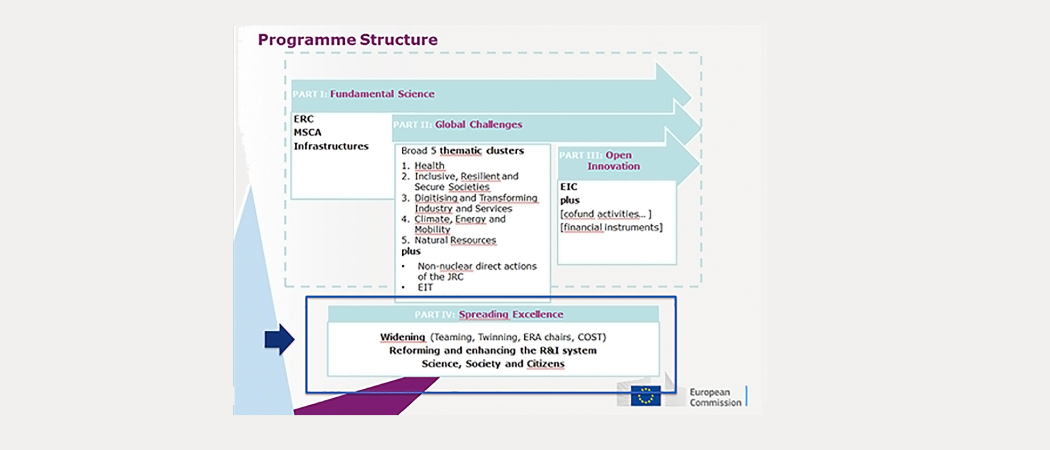Fast-changing draft of next EU Framework Programme highlights Macron’s plan for ‘disruptive innovation’ and bridging east-west research divide – but nothing is finalised yet

One of the European Commission slides circulating around Brussels this week
In an apparent effort to broaden political support for its next research programme, the European Commission has been floating some ideas on disruptive innovation and research cooperation that could appeal to key member-states.
A Commission slide presentation circulating around Brussels this week suggests that Framework Programme 9, to start in 2021, could include a new funding agency for disruptive innovation with a similar title as one proposed recently by French President Emmanuel Macron. Also, the plan could put emphasis on a portion of the programme it calls “spreading excellence” – following calls by east European members to spend more money on boosting science and technology capabilities across the EU.
A proviso on the proposals, which are undated and presented in rough form on three slides, say they are a work in progress and “not legally binding” – and in fact, it appears that the draft plans are changing by the day as Commission officials discuss their ideas with growing numbers of stakeholders.
A spokesman for Research Commissioner Carlos Moedas said “the Commissioner cannot comment on the proposals. There are lots on the table.”
But the ideas, however tentative, reflect the intense stage of programme drafting now underway in Brussels, as Commission officials rush towards their self-imposed deadline of publishing broad EU budget plans by May 30. With the UK, a big research supporter, leaving the bloc next year, the wishes of east European members will become more prominent – and they have long complained they don’t get enough benefit from EU research and innovation programmes. At the same time, President Macron has emerged as a strong – but very opinionated – advocate for EU research. The slides appear to reflect some preliminary efforts to balance the varied interests.
An EIC in two parts
One of the slides shows how a new European Innovation Council, proposed nearly three years ago by Moedas, could be created in 2021 by reorganising four existing Horizon 2020 funding streams into two main “instruments”.
An instrument called the EIC Pathfinder would accept proposals from any legal entity, including universities, and issue grants up to €5 million. The expected outcome of this funding would be a new start-up or business plan.
Meanwhile, an EIC Accelerator would help to scale-up promising products in development by companies with a “tailor-made” mix of grants, debt and equity. Funding would go up to €30 million, paid in tranches; and banks, venture capital firms and public innovation bodies would be invited to co-partner projects.
Responsibility for at least some of the EIC work could rest with the “possibly revamped” European Agency for Small and Medium Enterprises, an EU body that has responsibility for the popular SME Instrument. It could be renamed as the Executive European Agency for Disruptive Innovation.
Last September President Macron proposed creating a new European Agency for Disruptive Innovation to spur step-changes in technologies and markets – but as an inter-governmental, non-Commission agency. In response, Commissioner Moedas – who recently tweeted a photo of himself with Macron – has been arguing to keep it inside the Commission.
“To be frank, I think there’s no question about it; that if you want to have something of scale, something with stability of funding, something focused on excellence, you have to do it at Union level,” the Commissioner said last October.
Spreading excellence
The slides also show the Commission considering giving prominence to a part of the research programme it calls “spreading excellence.” The EU currently spends millions on efforts under this banner, on initiatives such as ‘teaming’ and ‘twinning’, which aim at enhancing the science capacity of Europe's poorest regions.
Under the popular EU "twinning" scheme, for instance, an elite institute like Germany’s Max Planck Society can team up with a less-developed institute in Poland to co-fund Polish research groups. Under "teaming", the same two countries could jointly submit business plans to the Commission for a new or upgraded research centre in the poorer partner’s country.
The slides, however, also incorporate other, non-east-west initiatives in the “spreading excellence” activities, including “reforming and enhancing the R&I system” and “Science, Society and Citizens.”
The Commission is under some political pressure to enhance opportunities for poorer-performing EU countries, while maintaining a core focus on rewarding excellence.
Schemes under the EU’s ‘widening participation’ programme, as the initiatives are also referred to, “have to continue and should be strengthened”, research ministers said in the conclusions of their competitiveness council meeting in December.
The research divide in Europe is widely acknowledged. In Framework Programme 7, which ran from 2007 - 2013, the EU’s newest members only won four per cent of total EU research funding. In the current Horizon 2020, that number has improved – but only by 0.4 per cent. The lion’s share of funding continues to go to research institutes and companies in the UK, Germany, France and the Netherlands.
Familiar challenges
Another slide suggests continuity in the “global challenges” the EU believes require further research. Five focus areas are mentioned. These are health; inclusive, resilient and secure societies; digitalising and transforming industry and services; climate, energy and mobility; and natural resources.
Under these broad headings are familiar research topics, covering infectious diseases, carbon neutral cities, bio-based systems, disaster resilience, data-driven health and others. The Commission has previously said that some of these challenges could be targeted with a new mission-driven formula, although this is not referred to in the slides.





 A unique international forum for public research organisations and companies to connect their external engagement with strategic interests around their R&D system.
A unique international forum for public research organisations and companies to connect their external engagement with strategic interests around their R&D system.